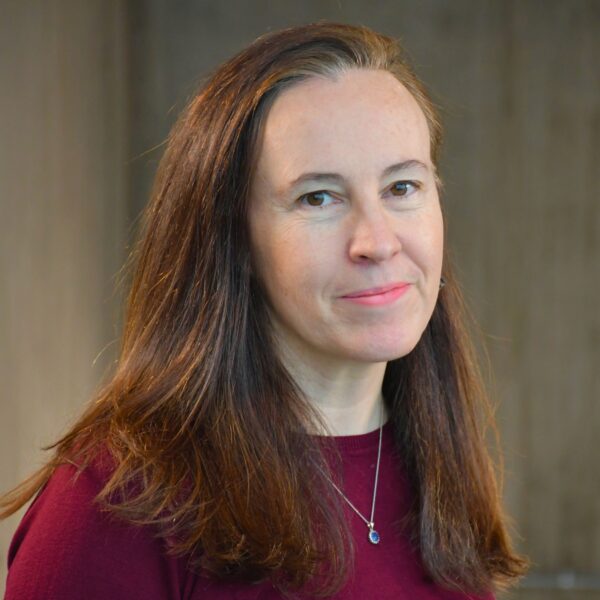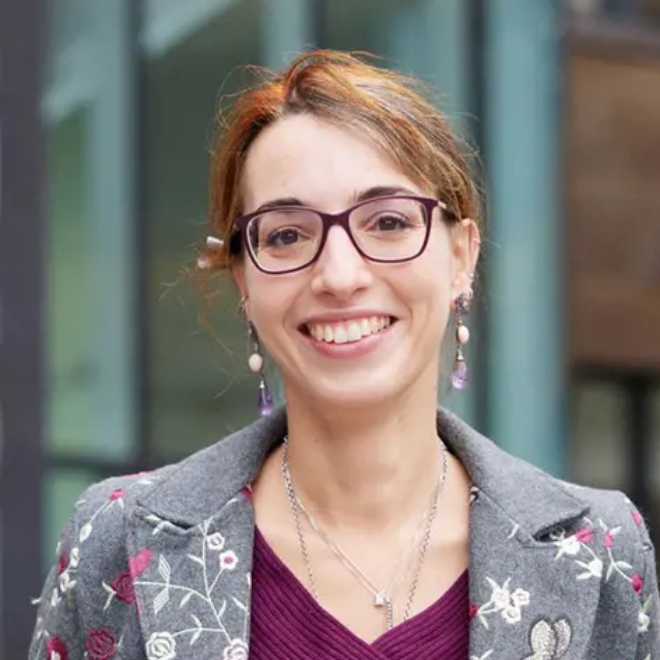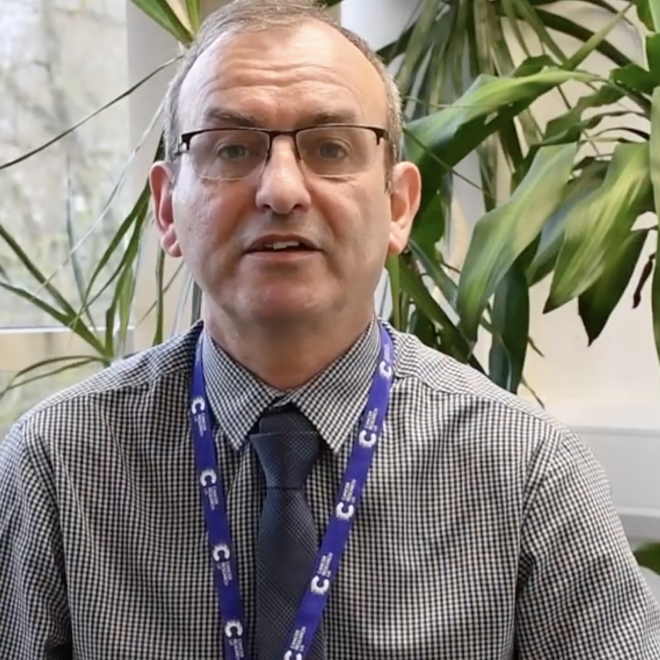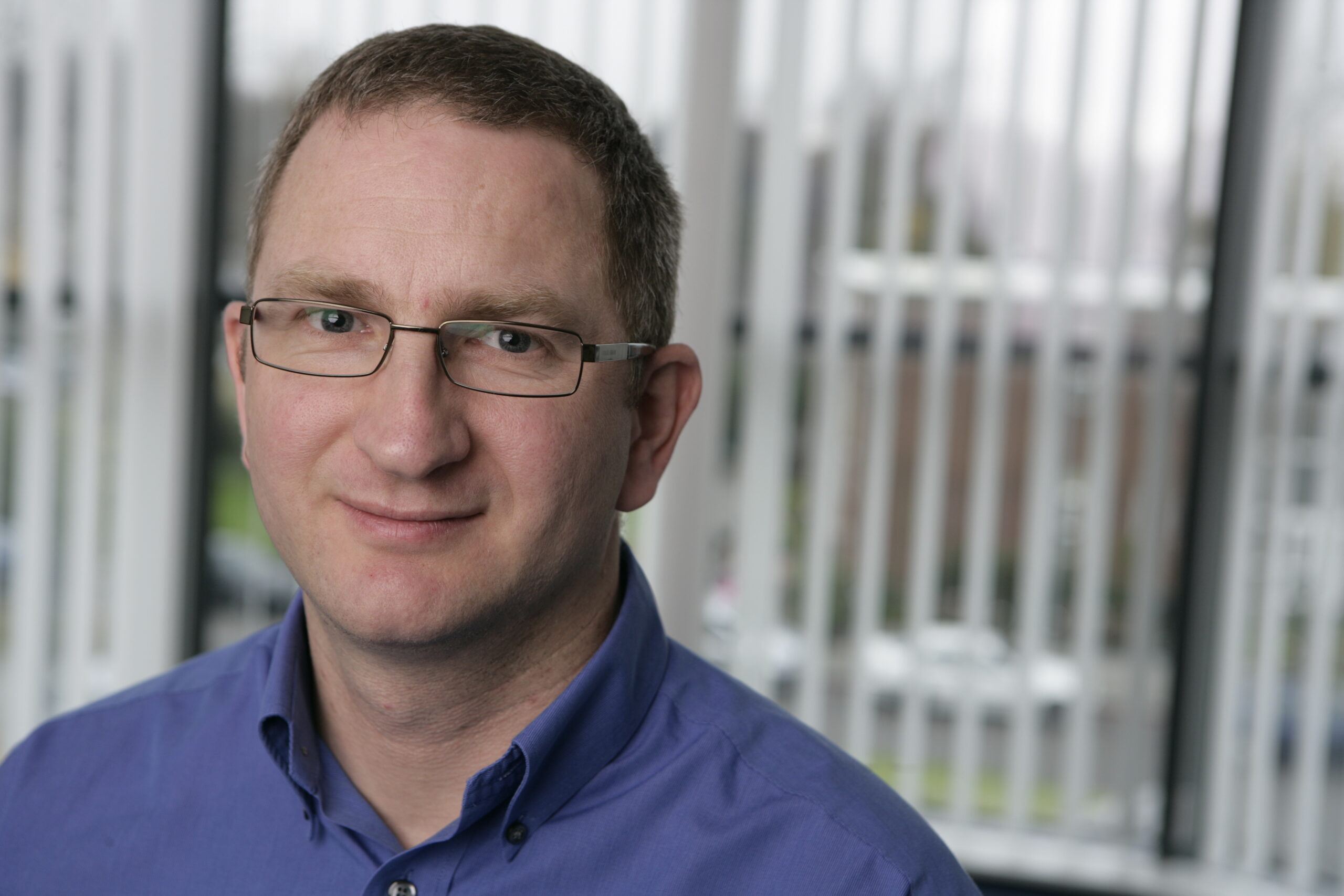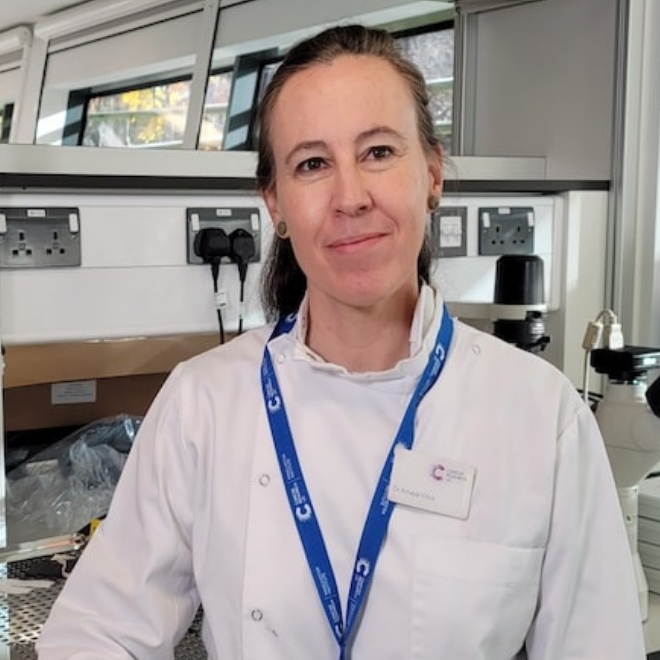Amaya Virós
Skin Cancer & Ageing Group Leader
Amaya is a Clinician Scientist who leads the Skin Cancer and Ageing group and undertakes clinical practice in dermatology. Her goal is to elucidate the mechanisms that drive metastasis in skin cancer patients and devise novel therapeutic strategies to treat or prevent metastatic spread.
About Dr Amaya Virós
Amaya obtained her medical degree from the University of Barcelona, before her clinical training in Dermatology and Venereology at Vall d’Hebron University Hospital, Barcelona. She became a Fulbright Scholar in dermatology and pathology at the University of California in San Francisco, and later joined the Institute of Cancer Research where she undertook work to complete her PhD with Prof Richard Marais.
In 2016, Amaya was awarded a Wellcome Intermediate Clinician Scientist Fellowship to develop her research programme that combined her doctoral experience of melanoma with her clinical interest in skin cancer and ageing. In 2023, she was awarded a Cancer Research UK Advanced Clinician Scientist Fellowship. Amaya is an Honorary Consultant in Dermatology at Salford NHS Foundation Trust, with a practice in general dermatology and high-risk skin cancer.
Her research aims to understand the mechanisms that drive more metastatic skin cancer in ageing patients and to develop novel therapeutic approaches for melanoma treatment by age, in metastatic organs. Amaya also leads a BRC project to develop novel biomarkers that predict skin cancer outcomes.
Groups
Qualifications
- PhD | 2013 | Autonomous University of Barcelona, Spain
- MD | 1999 | University of Barcelona, Spain
Interests
- Melanoma metabolism
- Cancer metastasis
- Ageing
Research Projects
Publications
- Systemic immunosuppression from ultraviolet radiation exposure inhibits cancer immunotherapy
- Stromal lipid species dictate melanoma metastasis and tropism
- The PI3K-AKT-mTOR axis persists as a therapeutic dependency in KRASG12D-driven non-small cell lung cancer
- Molecular characterization of fast-growing melanomas
- Molecular subtype, biological sex and age shape melanoma tumour evolution
Why I work at CRUK MI
“CRUK MI offers an exciting combination of world-class science and research vision. We are fortunate to collaborate and interact with leading cancer physicians at the Christie and Manchester hospitals, with a joint purpose to improve cancer care and patient survival.”
Visit Research Group
Skin cancers are the most incident cancers. Non-melanoma skin cancers are highly prevalent but have generally low mortality compared to melanoma skin cancer, which metastasizes in 20% of cases to the lymph nodes and distant organs. The risk of melanoma metastasis depends on primary tumour factors as well as on host factors such as old age and male sex. New targeted and immunotherapies are improving outcomes for some patients. Despite these advancements, the mechanisms of metastasis, therapy resistance, and the influence of host factors, such as age and immune function are not fully understood.
In the Skin Cancer and Ageing laboratory, we aim to discover the mechanisms that enable melanoma cells to metastasize and thrive in solid organs. We study the host factors such as age, sex and diet that support the survival and growth of melanoma cells during the metastatic process, as well as the tissue-specific factors in metastatic sites that impact the growth of melanoma cells once they seed a distant organ. This research aims to shed light on the interactions between melanoma cells and their environment, providing a foundation for potential therapeutic advancements.
We also aim to address fundamental questions of melanoma immunotherapy response by anatomic site. Recent advances in cancer immunotherapy have yet to fully explain the heterogeneity of immunotherapy responses in treatment-resistant sites such as the brain and the liver. We are investigating the host and local factors that drive treatment failure, to inform novel therapy approaches that are targeted to specific organs and host characteristics. A key aim of the group is to advance rationales of care adjusted by host and anatomic site characteristics.
Get in touch
All Institute publications
https://doi.org/10.1038/s44161-025-00740-z
Single-cell profiling reveals three endothelial-to-hematopoietic transitions with divergent isoform expression landscapes
11 November 2025
Institute Authors (6)
Robert Sellers, John Weightman, Wolfgang Breitwieser, Natalia Moncaut, Michael Lie-a-ling, Georges Lacaud
Labs & Facilities
Computational Biology Support, Molecular Biology, Genome Editing and Mouse Models
Research Group
Stem Cell Biology
11 November 2025
https://doi.org/10.1136/jitc-2025-012527
Systemic immunosuppression from ultraviolet radiation exposure inhibits cancer immunotherapy
31 October 2025
Institute Authors (4)
Isabella Mataloni, Antonia Banyard, Garry Ashton, Amaya Virós
Labs & Facilities
Mass and Flow Cytometry, Histology
Research Group
Skin Cancer & Ageing
31 October 2025
https://aacrjournals.org/cancerdiscovery/article/doi/10.1158/2159-8290.CD-24-1224/766638/Glucocorticoids-Unleash-Immune-dependent-Melanoma
Glucocorticoids Unleash Immune-dependent Melanoma Control through Inhibition of the GARP/TGF β Axis
15 October 2025
Institute Authors (12)
Charles Earnshaw, Poppy Dunn, Shih-Chieh Chiang, Maria Koufaki, Massimo Russo, Kimberley Hockenhull, Erin Richardson, Anna Pidoux, Alex Baker, Richard Reeves, Robert Sellers, Sudhakar Sahoo
Labs & Facilities
Computational Biology Support, Visualisation, Irradiation and Analysis
Research Group
Cancer Inflammation and Immunity
15 October 2025
/wp-content/uploads/2025/09/Annual_Report_2024.pdf
2024 Annual Report
23 September 2025
23 September 2025
https://doi.org/10.1182/blood.2024028033
An in vivo barcoded CRISPR-Cas9 screen identifies Ncoa4-mediated ferritinophagy as a dependence in Tet2-deficient hematopoiesis
4 September 2025
Institute Authors (1)
Justin Loke
Research Group
Myeloid Cancer Biology
4 September 2025
https://doi.org/10.1038/s41467-024-49692-1
Whole genome sequencing refines stratification and therapy of patients with clear cell renal cell carcinoma
15 July 2025
Institute Authors (1)
Samra Turajlić
Research Group
Cancer Dynamics
15 July 2025
Our vision for world leading cancer research in the heart of Manchester
We are a leading cancer research institute within The University of Manchester, spanning the whole spectrum of cancer research – from investigating the molecular and cellular basis of cancer, to translational research and the development of therapeutics.
Our collaborations
Bringing together internationally renowned scientists and clinicians
Scientific Advisory Board
Supported by an international Scientific Advisory Board
Careers that have a lasting impact on cancer research and patient care
We are always on the lookout for talented and motivated people to join us. Whether your background is in biological or chemical sciences, mathematics or finance, computer science or logistics, use the links below to see roles across the Institute in our core facilities, operations teams, research groups, and studentships within our exceptional graduate programme.





